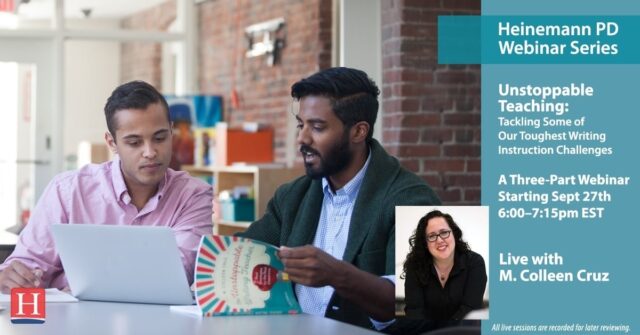
In Teaching Literature In The Context Of Literacy Instruction, coauthors Jocelyn Chadwick and John Grassie explore how the familiar literature we love can be taught in a way that not only engages students but does so within the context of literacy instruction, reflecting the needs of today’s classrooms. They address complex questions secondary English teachers wrangle with daily: Where does literature live within the Common Core’s mandates? How can we embrace informational texts in our literature classrooms? And most importantly, how can we help students recognize that canonical works are relevant to them?
Race and Gender: Not the Same Anymore
By Jocelyn Chadwick and John Grassie
We sit around a table, thick carpet, dark wood, well-worn leather chairs, even the Spring sun streaming through the windows does not quite lift the serious, somber, import of the room…and yet, we all know something is going to happen; we all know that not all is quite finished.
Author Luis Rodriguez asks, “Does anyone else have any questions?” A teen girl, sitting across from me, who has yet to speak, begins quietly, “I’m in a gang. I don’t want to die. How do I stay out of the grave like you did?” As somber and as serious as the feel in the room was, her question sparked electricity throughout and shifted it directly into the conference phone into the author’s mind, heart, and soul. What sparked the conversation was Rodriguez’s bitter, striking, and searing autobiographical tale of life on the streets of Los Angeles as a gang member.
—
The moment was profound and transformational
—
This scene, as we describe in our book occurred in 2003. The moment was profound and transformational. And yet, an outsider could have described it as a stereotype of urban, adjudicated youth, asking questions of someone with whom they identified. Fast forward: today with a completely different generation of students, we are finding that the “stereotypes” no longer actually apply. Known as Generation Z, children born after 1995, defy traditional, “stereotypical” codifications by race, gender, religion, class. Rather, Generation Z high school students across the codification board are generally reflective, challenging, intensely curious, thinking outside of the box, risk-takers, ever-ready to analyze, evaluate, and then blend atypical ideas, topics, genres, to cite a few. If allowed to feel they are an integral part of the learning/instructional process, they resemble a deft, nimble tennis player—constantly adjusting, moving in micro-seconds. As one who is privileged with teaching and learning with them, I find that I, too, must be nimble and malleable in thought, reaction, and response, while at the the same time being deliberate, reflective, and thoughtful.
These students necessarily ingest, digest, and deconstruct literature from a wholly different perspective. Immediacy, relevance, empowerment, visibility, responsibility, how characters, themes, moments fit into their way of making and creating meaning, into their world—these traits describe how Generation Z students interact with and require of literature today and require of us as ELA teachers. In one such experience during this summer with tenth grade students in Hartford, as we discussed the theme of social justice in the context of one of their anchor texts, Adventures of Huckleberry Finn, they made viable and fascinating connections with several canonical texts: La Divina Commedia, Merchant of Venice, for example, and they were curious when I mentioned Longinus and Aristotle. Yes, tenth graders; no, not elite or suburban—but urban students from a cross section of public and charter schools.
—
They are not codifiable, not traditional, not stereotypical
—
The message we have received from Generation Z students as they seem to “shout” loudly and distinctly through their queries and insatiable curiosity: we are not codifiable, not traditional, not stereotypical—not the same anymore. This new audience for us and the literature we love make an interesting and intriguing blend; our being privileged with exploring, discovering, and learning our literature anew catapults us into “a whole new exciting kind of life” as ELA teachers.
PD Nugget: The Power of Difference
Have students Identify characters from novels they are studying who are identified by one or more of the following list of traits: strong, courageous, intelligent, physically attractive, and memorable.
Next, apply the following terms to each of the same characters and describe how and or why the new description changes their role in the novel: masculine, feminine, African-American, Latino, White, Asian, gay, and transgendered.
For additional information, contact Heinemann Professional Development.
Click here to learn more about Teaching Literature In The Context of Literacy Instruction.
♦ ♦ ♦ ♦


Jocelyn A. Chadwick has been an English teacher for over thirty years—beginning at Irving High School in Texas and later moving on to the Harvard Graduate School of Education where she was a professor for nine years and still guest lectures. Dr. Chadwick also serves as a consultant for school districts around the country and assists English departments with curricula to reflect diversity and cross-curricular content. For the past two years, she has served as a consultant for NBC News Education's Common Core Project for Parents, ParentToolkit. In June 2015, Chadwick was elected Vice President for the National Council of Teachers of English.
John Grassie is a veteran broadcast journalist, with more than 25 years’ experience producing news coverage, program series, and documentaries for Public Television, NBC News, and Discovery. During his broadcast career, Grassie’s work received numerous awards for excellence in journalism.


